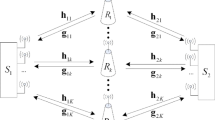Abstract
In this paper, a sort-based relay selection algorithm is proposed for decode-and-forward wireless relay systems. The proposed algorithm can reduce computational complexity and system overhead in the relay selection for practical decode-and-forward wireless relay systems with multiple sources and multiple relays. This would be a very important improvement. Firstly, the sufficient and necessary conditions for a relay to be feasible to a source are derived. By adopting relay transmission via its feasible relay, the source can improve channel capacity compared to direct transmission. Then, a sort-based relay selection algorithm is proposed based on the sufficient and necessary conditions. In the proposed algorithm, each relay makes decision on its feasibility individually, but the final source-relay paring decision is made in a centralized manner. Simulation results show that the proposed algorithm can provide considerable system performance improvement over the existing algorithm. Especially at low signal-to-noise (SNR) region, the performance of the proposed algorithm almost reaches the optimal one.
Similar content being viewed by others
References
Pabst R, Walke B, Schultz D, et al. Relay-based deployment concepts for wireless and mobile broadband radio. IEEE Commun Mag, 2004, 42: 80–89
Sendonaris A, Erkip E, Aazhang R. User cooperation diversity, Part I: System decription. IEEE Trans Commun, 2003, 51: 1927–1938
Kramer G, Gastpar M, Gupta P. Cooperative strategies and capacity theorems for relay networks. IEEE Trans Inf Theory, 2005, 51: 3037–3063
Laneman J, Tse D, Wornell G W. Cooperative diversity in wireless networks: efficient protocols and outage behavior. IEEE Trans Inf Theory, 2004, 50: 3062–3080
Boyer J, Falconer D D, Yanikomeroglu H. Multihop diversity in wireless relaying channels. IEEE Trans Commun, 2004, 52: 1820–1830
Ikki S S, Aissa S. Multihop wireless relaying systems in the presence of cochannel interferences: performance analysis and design optimization. IEEE Trans Veh Technol, 2012, 61: 566–573
Soithong T, Aalo V A, Efthymoglou G P, et al. Outage analysis of multihop relay systems in interference-limited Nakagamifading channels. IEEE Trans Veh Technol, 2012, 61: 1451–1457
Mahinthan V, Mark J W, Shen X. A cooperative diversity scheme based on quadrature signaling. IEEE Trans Wirel Commun, 2007, 6: 41–45
Cai J, Shen X M, Mark J W, et al. Semi-distributed user relaying algorithms for amplify-and-forward wireless relay networks. IEEE Trans Wirel Commun, 2008, 7: 1348–1357
Wang F F, Liu Y A, Xie G. Improving amplify-and-forward relay selection algorithm based on partial relay link. J China Univ Posts Telecommun, 2010, 17: 56–61
Nosratinia A, Hunter T E. Grouping and partner selection in cooperative wireless networks. IEEE J Sel Areas Commun, 2007, 25: 369–378
Lin Z, Erkip E, Stefanov A. Cooperative regions and partner choice in coded cooperative systems. IEEE Trans Commun, 2006, 54: 1323–1334
Lo C K, Heath R W, Vishwanath S. Hybrid-ARQ in multihop networks with opportunistic relay selection. In: IEEE International Conference on Acoustics, Speech and Signal Processing, Hawaii, 2007. 617–620
Shi J, Yu G D, Zhang Z Y, et al. Partial channel state information based cooperative relaying and partner selection. In: IEEE Wireless Communication and Network Conference, Kowloon, 2007. 975–979
Jung Y S, Lee J H. Partner assignment algorithm for cooperative diversity in mobile communication systems. In: IEEE Vehicular Technology Conference-Spring, Melbourne, 2006. 1610–1614
Brennan D. Linear diversity combining techniques. Proc IEEE, 2003, 91: 331–356
Author information
Authors and Affiliations
Corresponding author
Rights and permissions
About this article
Cite this article
Xie, G., Liu, Y., Gao, J. et al. Sort-based relay selection algorithm for decode-and-forward relay system. Sci. China Inf. Sci. 56, 1–8 (2013). https://doi.org/10.1007/s11432-012-4776-3
Received:
Accepted:
Published:
Issue Date:
DOI: https://doi.org/10.1007/s11432-012-4776-3




